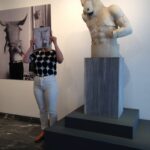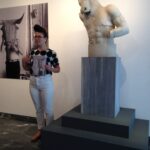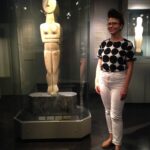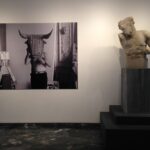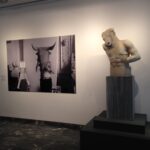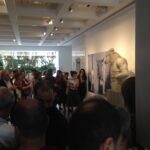Guest post by Suzanne Paszkowski
The Museum of Cycladic Art is an amazing cultural institution in Athens, with a permanent collection of Cycladic artworks from the third millennium BC, as well as artefacts from ancient Greece and Cyprus. In addition to its ancient collections, the museum also regularly presents temporary exhibitions that bring ancient art into dialogue with contemporary art from around the world. Both of these aspects of the museum gave me compelling reasons to do an internship there this summer.
When I first arrived at the end of May, the museum was preparing for the opening of its summer exhibition on Picasso and Antiquity. I got a preview of the exhibition via the catalogue, as I helped to copyedit its final proofs. It was exciting to watch the exhibition come together, with artworks arriving from museums and private collections from all over Greece and Europe, and everyone at the museum was very happy to celebrate the opening of the exhibition on June 19. After the opening, I also had the chance to work in the communications department of the museum, promoting the exhibition on various social media platforms. It was a fun and fast reintroduction to social media, which I’ve been off for some years: I learned what it’s like to “produce content,” but also, more importantly, I witnessed how much collaborative effort goes into the museum’s digital presentation.
Aside from working on the Picasso exhibition, I also had the chance to work closely with the permanent collection. After studying the museum’s collection of Cycladic art and researching ancient Cycladic civilization, I gave daily tours of the Cycladic collection to museum visitors. This was a great experience for thinking about aesthetics, since many people find Cycladic art beautiful and captivating without knowing much about its history. One reason for this is the influence of Cycladic and other so-called “primitive” cultures on artists of the early twentieth century like Brancusi, Modigliani, and Giacometti. These artists, in turn, had a great influence on modern aesthetics, shaping forms and figures that we now find beautiful. This aesthetic influence has come at a certain cost, however, since the high esteem and market valuation of Cycladic figurines also made them the target of looters wishing to profit from them on the black market for art. So a lot of Cycladic art is without provenance, making it difficult for historical and archaeological study of the culture that produced the figurines. And yet, even without this knowledge, we can still find them beautiful. It is an anti-Platonic point: knowledge and beauty may not be the same. But it is also a lesson in reception of ancient artefacts and the contingent factors that go in to shaping aesthetic preferences.
The final, very interesting project that I worked on at the museum was to help with initial research and brainstorming for a future exhibition on the ancient Greek concept of beauty. This was a project that seemed practically designed for me and my research interests in ancient aesthetics and perception. It was a good experience in pragmatic thinking, since with museum exhibitions, materials have to be presented in a very different way from a philosophical essay on beauty. It was also a chance for me to read many recent publications on the topic and to talk through ideas about beauty with colleagues at the museum. The topic of beauty was also made all the more interesting this summer in Athens, since there have been so many exhibitions taking place at museums and galleries throughout the city. I have had the opportunity to engage with and learn from contemporary artists about their perspectives on art and beauty in relation to the city and its history, and this experience has certainly shaped my own ideas about Greek art, ancient and modern.
All in all, it has been a fantastic summer internship experience in Athens. I look forward to seeing the museum’s future exhibitions. And I already cannot wait to return to the dynamic city of Athens.
Suzanne Paszkowski, Harvard University
Suzanne Paszkowski is a PhD student in Classical Philosophy at Harvard University. She is interested in ancient philosophical ideas about ethics and aesthetics, and her dissertation topic is on ancient Greek ideas about addiction and aesthetic therapeutic responses. She loves learning languages, especially Greek, ancient and modern.
Museum of Cycladic Art Summer Internship
This 5-week program for Harvard students is meant to familiarize interns with the activities performed in a museum environment, and to provide high-quality professional training. The interns work in collaboration with curators, museum educators, and communication experts.

